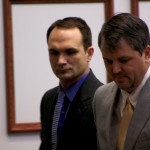Austin Ramsey
News Editor

Gail Minger occupied a seat in the far corner of the Calloway County Circuit Courtroom Monday morning, but her mind was elsewhere.
Minger’s thoughts were with her son, Michael, who died in Hester Residential College 13 years ago when a fire was set outside his fourth-floor dorm room, trapping him inside.
Meanwhile, across the courtroom, Jerry Walker, a Paducah, Ky., man indicted a second time in more than a decade for starting the fire, sat against a far wall, fidgeting and twiddling his thumbs – his thoughts, too, visibly distant.
In the middle of the courtroom, between Walker and Minger, and before Circuit Judge Dennis Foust, stood Commonwealth Attorney Mark Blankenship and Walker’s defense attorney Richard Null.
Null used Monday’s status hearing to appeal Walker’s re-indictment a second time. He said the prosecution had violated Walker’s rights to due process of the law in the more than 10 years that had passed since charges were dropped against him at the hands of a hung jury in 2001.
It wasn’t the first time Null has used that argument. In early December, at a similar status hearing, Null petitioned the court by saying the indictment was a violation of double jeopardy laws and its location in Calloway was too close to the Murray State’s campus, prejudicing the defense’s efforts.
But with each new hearing, the case continues on, incorporating more public attention and filling courtrooms in both Calloway and Marshall counties.
“I think the court should dismiss this case and find it in violation of due process,” Null said.
He argued the commonwealth had allowed the extended amount of lag time in the mistrial and the re-indictment to be used as a tactical advantage over any arguments the defense may make.
Null said he had tried to acquire several pieces of evidence from the prosecution that were useful in the last trial, that Blankenship says are either lost or been disposed of.
“We’re not responsible for holding on to this evidence,” he said. “The court is not responsible for holding on to this evidence. This is the commonwealth.”
Null argued that a logbook intended to show the residents who went in and out of Hester the night before the early-morning fire had been lost by the security guard responsible for it. He said the logbook used to develop the prosecution’s case 10 years ago was not contemporaneously made, but developed by memory two years after the fire had been set. That evidence hurt Walker’s position in the first place, Null argued.
He said there was a recording by a Murray donut shop owner from 13 years ago in which the owner tells a state trooper that on the night of the fire, three individuals covered in soot walked into his shop and huddled in a corner acting suspicious. The owner said he could identify one of the individuals as a member of the University rugby team.
Null said recent requests to hear this recording have been put off by the prosecution, and Null said it was exculpatory evidence – proof tending to show innocence – in the case against Walker.
“They can’t find it,” Null said, throwing his hands in the air. “Either before the first trial, or before the 10-year delay, the interview, which is probably the most important piece of exculpatory evidence, has been lost, and they should have it. That’s a prejudice that no courtroom and no testimony could ever cure.”
But the prosecution, led by Blankenship, said they too had not seen the evidence, and were unsure of its existence.
Blankenship said the prosecution was not using the delay as a way to gain some tactical advantage; he simply wanted to bring justice to a cold case that had plagued his predecessor, attorney Mike Ward.
He said Null’s argument was full of factual fallacies.
Blankenship showed the court-documented evidence that previous prosecutor Jay Wethington had instructed investigators with the Kentucky State Police to continue looking at the case in 2005, four years after the mistrial.
Developing technology allowed prosecutors to review existing evidence in new ways, he said, and determine the movement of the fire based on levels of carbon monoxide found in Michael Minger’s body as well as that in Michael Priddy – another student who was severely injured in the blaze.
For that reason, Blankenship concluded, the state did not wait to re-indict Walker – rather, the evidence necessary to re-indict had not been developed until a decade after the original trial.
“I would rather lose this case than win it by cheating,” he said. “The argument here is that we could have been going after Mr. Walker a long time ago but we intentionally delayed so that we would have an advantage over him. That’s repulsive to me.”
Foust has still not ruled on Null’s motions. A jury trial is set to start July 6.
Contact Ramsey


























































































